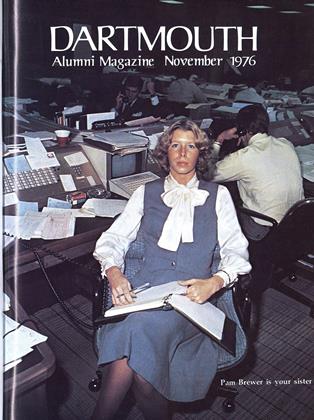Two days before this month's presidential election, Alanus Goliardus, a "good fellow" and Goliardic author from the University of Femenye, confronted Petrus Travicensis, philosopher, theologian, and church apologist, in a broadcast debate. The issue in question was "The Wife of Bath: Whore of Babylon or First Liberated Woman?" The debate was held in the Cohen-Bissell lounge before a Halloween-night audience of about 150 students and a crew from WFRD, Dartmouth's FM station.
Travicensis was the first to enter the debating arena. Most of the crowd, which was composed principally of males, cheered. He was attired in a brown friar's habit and sandals and swung a censer to and fro from a chain. Liturgical music played and the lounge was soon redolent with ecclesiastical incense. After the friar sat down, Goliardus, a gentle-looking bear of a man, walked" in with the aplomb of a champion pugilist. He wore a mortarboard and a scholar's gown of brilliant orange and aqua blue. Court music played while Goliardus danced a few steps with the woman who had introduced him.
"Fellow theologians, fellow virgins, and the rest of you...,"Travicensis addressed the crowd from behind a lectern adorned with a cross. He soon proved to be a melodramatic villain of the worst sort - a misanthropic, misogynistic misogamist. He began to talk about witches, who reminded him of the Wife of Bath, who reminded him of witches who "ride on long, hard sticks and who wear deep, dark, mysterious conical hats on their heads...." The audience loved it. "I am not accustomed to using these profane examples," said the friar, who during the debate claimed personal intercourse with all the saints, . .but I know my audience. You must begin with the profane in order to convert the profane." Later, he said, "We must go below the surface of poetry to seek the deep truth." Travicensis was a true medieval orator, modulating his voice, speaking in a grating snarl, occasionally interjecting a "tee-hee, tee-hee, tee-hee" into his sentences. He probed for the "tropological, typological, allegorical, anagogical meaning" of Chaucer's Alice. "Morally she is damned. She is the epitome of the seven deadly sins," he said. Some women in the audience hissed.
When Travicensis had finished his harangue, Goliardus, the "good fellow" in this debate, arose and stood behind his lectern, which on its front bore the woman's genetic symbol. "Woman is man's joy," he began his argument. "The power and the beauty of the female is the principle in all creation." His voice was soothing and mellifluous, and tinged with the impassioned anguish of a man who didn't understand why anyone would besmirch his "most beautiful good jewel most dear ... light above all lights." Goliardus savored each word as he spoke, the way a poet does when he recites his own verses. He pleaded for the "true meaning" of the Wife of Bath, "the deep, deep meaning." As he completed his speech, he appeared to be brushing tears from his cheeks.
Alice of Bath had five legal husbands and in The Canterbury Tales is quoted as saying, "I nil envye no virginitee." "The debate," Peter Travis later explained while relaxing in his Sanborn House office, "is a didactic demonstration to teach about a real problem in the Middle Ages ... of various attitudes towards women." Travis and Alan Gaylord together each fall instruct an English Department course on Chaucer. In the Middle Ages, Travis continued, women were variously satirized and idealized in literature as saintly creatures; and there were great arguments during that period to reconcile sex in marriage, considered by some clerics as a venial sin, with the need to propagate the human race.
Travicensis and Goliardus both delivered two lengthy rebuttals after the opening speeches. Most, if not all, of the arguments were ad hominem appeals, for the adversaries were fine rhetoricians who gesticulated prodigiously while they spoke. Both interlarded their speeches with Latin and Middle English quotations. Travicensis appealed for "allegoria," Goliardus for "littera." Quotations, all authentic, were cited from Andrew the chaplain, St. Paul, Innocent III, St. Jerome, Andreas Cappellanus, St. Gregory, and Alanus de Insulis, a 12th-century philosopher and poet. At one point, Travicensis issued forth a volley of alliteration, calling his opponent "a satanic Saran Wrap of sodomy ... a bathetic Beelzebub of Babylon ... an aardvark of aberrant amour ... a codpiece of coital cacophony ... an antediluvian anti-Christ." Goliardus countered: "We deal not with the invective which the Agnew dei has given us." And so it went. Near the end of the debate, Travicensis inveighed against the audience: "They arrange this in the College for you to read? And you could be reading St. Jerome.... If you people are going to keep on going for poetry and literature and art you are simply going to burn in the everlasting bonfire!" The audience laughed and hissed. The debate concluded with both the friar and the "good fellow" standing at their lecterns. "Woman ... woman ... woe-man," said Travicensis. "Woman ... woman ... woo-man," said Goliardus. "Deo gratias," they uttered in unison.
 View Full Issue
View Full Issue
More From This Issue
-
 Feature
FeatureJUST LIKE THE REST OF US
November 1976 By A. KELLEY FEAD -
 Feature
FeatureBibliographical Branding Irons
November 1976 By DAVID WYKES -
 Feature
FeatureThe and the
November 1976 By JAMES L. FARLEY -
 Feature
FeatureFive Deadly Threats
November 1976 By John G. Kemeny -
 Article
ArticleEight-y!
November 1976 -
 Article
ArticleAlan versus Them 'It would be boring otherwise'
November 1976 By PIERRE KIRCH'78
Article
-
 Article
ArticleConcerts Listed
November 1946 -
 Article
ArticleSailing Champ
November 1948 -
 Article
ArticleNext Year in Hanover
NOVEMBER 1988 -
 Article
ArticleSun Valley
January 1940 By Dick Durrance '39 -
 Article
ArticleTHE ALUMNI ALCOVE IN THE COLLEGE LIBRARY
By Eugene Francis Clark '01 -
 Article
ArticleD. O. C. of Boston
January 1940 By Francis C. Ryder '30


